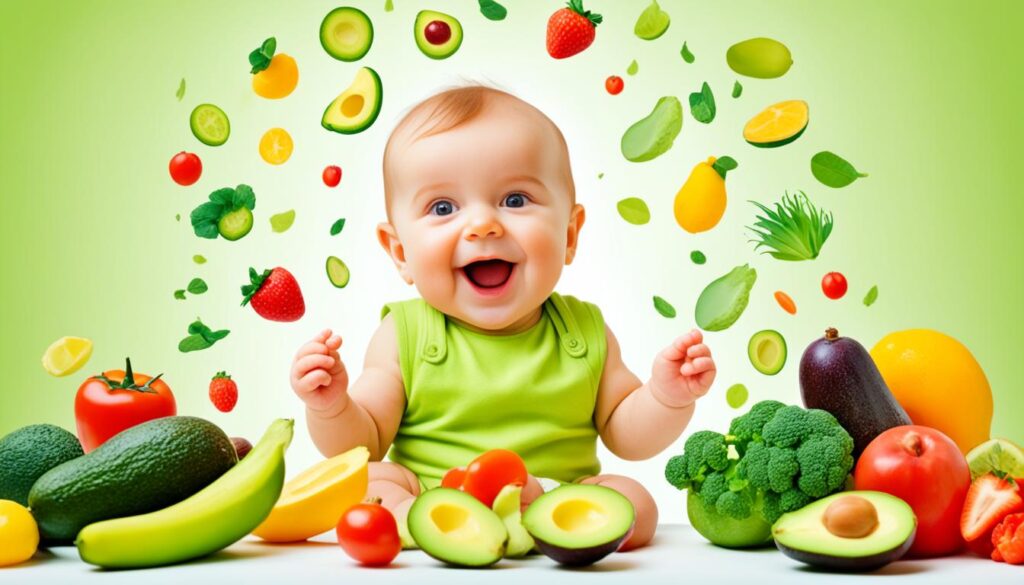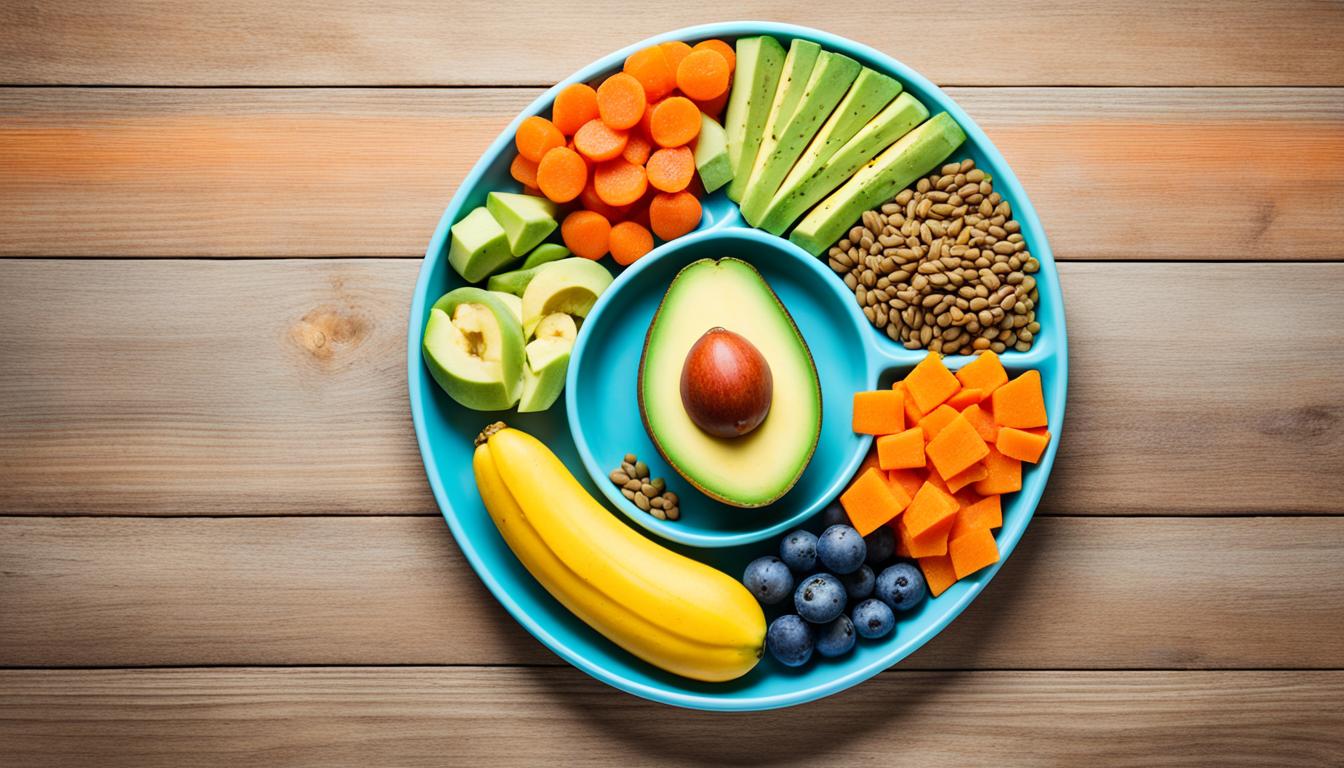Boost Baby’s Weight: Foods To Help Baby Gain Weight
Is your baby struggling to gain weight? Proper nutrition plays a vital role in promoting healthy weight gain in infants. While it’s normal for babies to experience a slight drop in weight during their first few days of life, it’s important to keep an eye on their growth and ensure they are getting the necessary nutrients to thrive.
Introducing high-calorie and nutrient-dense foods can help your baby pack on the pounds and achieve a healthy weight. In this article, we will explore a variety of healthy baby food choices that can support your baby’s weight gain journey.
Remember, always consult with your baby’s pediatrician before making any significant changes to their diet.
Skip To The Following Sections
- Key Factors for Baby Weight Gain
- Foods for Babies Under 6 Months
- Foods for Babies 6-9 Months
- Foods for Babies Over 1 Year
- FAQ
- What are some high-calorie baby foods to help my baby gain weight?
- Why is fat important for baby weight gain?
- How can I ensure my nursing newborn is getting enough calories?
- When can I introduce solid foods to my baby?
- What are some nutrient-rich foods for babies between 6 and 9 months?
- How can I ensure proper nutrition for my baby after they turn 1 year old?
- Source Links
Key Takeaways:
- Proper nutrition is crucial for promoting healthy weight gain in infants.
- Consult with your baby’s pediatrician before making any significant changes to their diet.
- Introduce high-calorie and nutrient-dense foods to support your baby’s weight gain.
- Monitor your baby’s growth using growth charts to ensure they are following proper growth patterns.
- Always prioritize a balanced and nutritious diet for your baby.
Key Factors for Baby Weight Gain
When it comes to your baby’s weight gain, there are several key factors to consider. Understanding these factors can help you ensure that your little one is on track for healthy growth and development.
Newborn Weight Loss
It’s important to know that newborns often experience weight loss in the first few days after birth. This is normal and typically due to fluid loss. However, by the end of the second week, babies should regain their birth weight. If you have concerns about your newborn’s weight, consult with your pediatrician for guidance and reassurance.
Calorie Content of Breast Milk and Formula
Breast milk and formula are vital sources of nourishment for infants. Both provide essential calories that support your baby’s growth and development. It’s worth noting that approximately half of the calories in breast milk and formula come from fat, which is crucial for your baby’s overall health and weight gain.
Importance of Fats for Babies
Fats play a crucial role in your baby’s health and development. They are essential for brain and nervous system development, helping to support cognitive function and overall growth. Fats also aid in the absorption of important vitamins and provide your baby with energy. Including healthy sources of fats in your baby’s diet is essential for their overall well-being.
Role of Fats in Brain Development
The brain experiences rapid growth and development during the early stages of life. Fats play a crucial role in supporting this process. They provide structural components for brain cells and aid in the formation of myelin, a fatty substance that protects and insulates nerve fibers. Ensuring an adequate intake of fats is vital for your baby’s brain development.
Absorption of Vitamins
Fats play a vital role in the absorption of fat-soluble vitamins A, D, E, and K. These vitamins are essential for your baby’s overall health and development. By consuming an adequate amount of healthy fats, your baby can absorb these vital vitamins and benefit from their numerous functions in the body.
Growth Charts for Babies
Monitoring your baby’s growth is important to ensure they are following a healthy growth pattern. Growth charts provide valuable insights into your baby’s weight gain and can help identify any potential issues or concerns. Regularly consulting with your healthcare provider and tracking your baby’s growth is crucial to their overall well-being.
| Factors | Importance |
|---|---|
| Newborn Weight Loss | Transient and normal, should regain birth weight by the second week |
| Calorie Content of Breast Milk and Formula | Approximately half of the calories come from fat |
| Importance of Fats | Crucial for brain development, vitamin absorption, and overall growth |
| Role of Fats in Brain Development | Vital for brain cell structure and myelin formation |
| Absorption of Vitamins | Fats aid in the absorption of fat-soluble vitamins |
| Growth Charts | Help monitor and ensure healthy growth patterns |
Foods for Babies Under 6 Months

During the first six months of your baby’s life, breast milk or formula should be their primary source of nutrition. Breastfeeding is recommended as it provides essential nutrients for your baby’s growth and development. If you are formula feeding, make sure to choose a formula that meets your baby’s nutritional needs.
For breastfed newborns, the feeding frequency is typically every 2-3 hours. It’s important to ensure that your baby is emptying the breast during feedings, as this allows them to receive the hindmilk, which is rich in fats and calories.
Once your baby reaches the age of one, you can introduce whole milk to encourage weight gain. Whole milk is a good source of healthy fats and provides the necessary calories for growth.
When it comes to introducing solids, there are several nutrient-rich options that can support your baby’s healthy weight gain:
- Avocados: Avocados are a great first food for babies due to their creamy texture and healthy fats. They are rich in monounsaturated fats, which are essential for brain development.
- Calorie-rich fruits: Bananas and pears are excellent choices as they are easy to digest and provide natural sugars and calories.
- Protein-rich foods: Lentils are a great source of plant-based protein and can be prepared as a puree or mashed for your baby.
- Ground meat: Introduction of ground meat provides a good source of protein and iron, which is essential for your baby’s overall development.
- Whole milk yogurt and cottage cheese: These dairy products are rich in protein and calcium, which are essential for bone development.
- Oatmeal: Oatmeal is a nutrient-rich option that provides fiber and essential vitamins and minerals.
It’s important to introduce these foods gradually and one at a time, monitoring your baby for any signs of food allergies or intolerances. Always consult with your pediatrician before introducing any new foods to your baby’s diet.
Foods for Babies 6-9 Months

Around 6 months, it’s time to introduce your baby to solid foods. This exciting milestone marks a new chapter in their development as they explore different flavors and textures. It’s important to choose foods that provide the necessary nutrients for their growth and development. Here are some nutritious options to consider:
Transitioning to Solid Foods
When introducing solid foods, start with single-ingredient purees to identify any potential allergies or sensitivities. Begin with small spoonfuls and gradually increase the quantity as your baby adjusts to the new textures.
Introducing Avocado
Avocado is a fantastic first food for babies due to its creamy texture and healthy fats. It’s packed with monounsaturated fats, which are essential for brain development and overall growth. Mash a ripe avocado and offer it to your baby as a tasty and nutritious treat.
Oatmeal Cereal for Fiber and Nutrients
Oatmeal cereal is an excellent source of fiber and other important nutrients. It can help regulate your baby’s digestion and keep them feeling full and satisfied. Mix a small amount of oatmeal cereal with breast milk, formula, or water, and gradually increase the consistency as your baby gets used to thicker textures.
Peanut or Almond Butter for Protein and Healthy Fats
Introducing nut butters, such as peanut or almond butter, can provide a good source of protein and healthy fats. Start with a thin layer of peanut or almond butter on a soft, baby-friendly cracker or toast. Make sure to choose nut butter without added salt, sugar, or other preservatives.
Adding Fresh Goat Cheese for Protein and Calcium
Fresh goat cheese is a tasty way to introduce protein and calcium into your baby’s diet. It has a milder flavor compared to cow’s milk cheese, making it more appealing to young taste buds. Offer small, soft pieces of fresh goat cheese. Remember to check for any dairy allergies or intolerances before introducing this cheese.
Introduction of Cooked Quinoa
Cooked quinoa is a nutrient-rich grain that provides essential vitamins, minerals, and carbohydrates for energy. It is also gluten-free, making it suitable for babies with gluten sensitivities. Cook quinoa until soft and offer small spoonfuls as a side dish or mixed with pureed fruits or vegetables.
Calorie-Rich Mangoes
Mangoes are delicious and calorie-rich fruits that are also high in fiber. They provide essential vitamins and minerals while satisfying your baby’s sweet cravings. Peel and puree ripe mangoes, or cut them into small, soft pieces for your baby to grasp and self-feed.
| Food | Nutrients | Benefits |
|---|---|---|
| Avocado | Healthy fats, vitamins, minerals | Support brain development, aid in growth |
| Oatmeal cereal | Fiber, iron, vitamins | Regulate digestion, provide essential nutrients |
| Peanut or almond butter | Protein, healthy fats | Boost protein intake, promote healthy growth |
| Fresh goat cheese | Protein, calcium | Support bone development, provide essential nutrients |
| Cooked quinoa | Vitamins, minerals, carbohydrates | Provide energy, essential nutrients for growth |
| Mangoes | Fiber, vitamins, minerals | Boost calorie intake, satisfy sweet cravings |
Remember to introduce new foods gradually, one at a time, and watch for any signs of allergies or digestive discomfort. Always consult with your baby’s pediatrician before introducing any new foods to ensure they are developmentally ready and to address any specific concerns or recommendations.
Foods for Babies Over 1 Year
After the first year, your baby’s growth rate may slow down compared to their early months. Providing balanced nutrition is crucial during this phase to support their healthy development. One important addition to their diet is fish, which is rich in protein and omega-3 fatty acids. These nutrients are essential for their brain and overall growth. Consider incorporating fish like salmon and tuna into their meals to ensure an adequate intake of these beneficial nutrients.
Another way to boost your baby’s nutrition is by adding healthy fats to their diet. Olive oil and avocado oil are excellent options as they provide essential fatty acids that are vital for their brain development and overall well-being. Including these oils in your baby’s meals can help support their healthy weight gain.
Mindful supplementation with iron-rich foods is also essential for babies over 1 year old. Around this time, iron stores begin to deplete, and introducing iron-rich foods like lean meats, fortified cereals, and dark leafy greens can help prevent iron deficiency and support healthy growth. Ensure you consult with a healthcare professional to determine the appropriate iron supplementation for your baby.
A balanced nutrition plan is essential for toddlers, whose calorie needs may slightly decrease compared to infants. However, they still require a significant amount of healthy fats for their growth and development. Focus on offering a variety of nutritious foods that provide a balance of carbohydrates, proteins, healthy fats, vitamins, and minerals. Consulting with a healthcare professional can help ensure your toddler’s nutritional needs are met for healthy weight gain and overall well-being.
FAQ
What are some high-calorie baby foods to help my baby gain weight?
Nutrient-dense options for increasing calorie intake in babies include avocados, bananas, pears, lentils, ground meat, whole milk yogurt, cottage cheese, and oatmeal cereal. These foods provide a balance of fats, proteins, and calories to support healthy weight gain.
Why is fat important for baby weight gain?
Fat is crucial for the development of a baby’s brain and nervous system. It also helps in the absorption of important vitamins. Approximately half of the calories in breast milk and formula come from fat, making it essential for healthy growth.
How can I ensure my nursing newborn is getting enough calories?
Breastfed newborns generally feed every 2-3 hours. It’s important to ensure they are fully emptying the breast to get the hindmilk, which is rich in nutrients. Monitor your baby’s weight using growth charts and consult with a healthcare provider to ensure they are following proper growth patterns.
When can I introduce solid foods to my baby?
Solid foods can be introduced to babies around 6 months of age when they start showing readiness. Avocado is a great transitional food due to its healthy fats and mild taste. Oatmeal cereal is also rich in fiber and can be easily added to their diet.
What are some nutrient-rich foods for babies between 6 and 9 months?
Peanut or almond butter provides protein and healthy fats, while fresh goat cheese is a good source of protein and calcium. Cooked quinoa is a nutrient-rich option, and mangoes are calorie-rich and rich in fiber. Introduce these foods gradually and one at a time to monitor for any allergies or reactions.
How can I ensure proper nutrition for my baby after they turn 1 year old?
After the 1-year mark, it’s important to provide balanced nutrition. You can introduce fish for protein and omega-3 fatty acids. Adding olive or avocado oils can provide healthy fats. Iron-rich foods should be considered for supplementation, as babies may start to deplete their natural iron stores around this time. Consulting with a healthcare professional can help ensure your toddler’s nutritional needs are met for healthy weight gain and overall development.
Source Links
- https://www.parents.com/baby/feeding/center/foods-to-encourage-healthy-baby-weight-gain/
- https://www.cafebabytogo.com/blogs/baby-feeding-tips/foods-to-make-baby-gain-weight
- https://www.healthline.com/nutrition/food-for-baby-to-gain-weight










